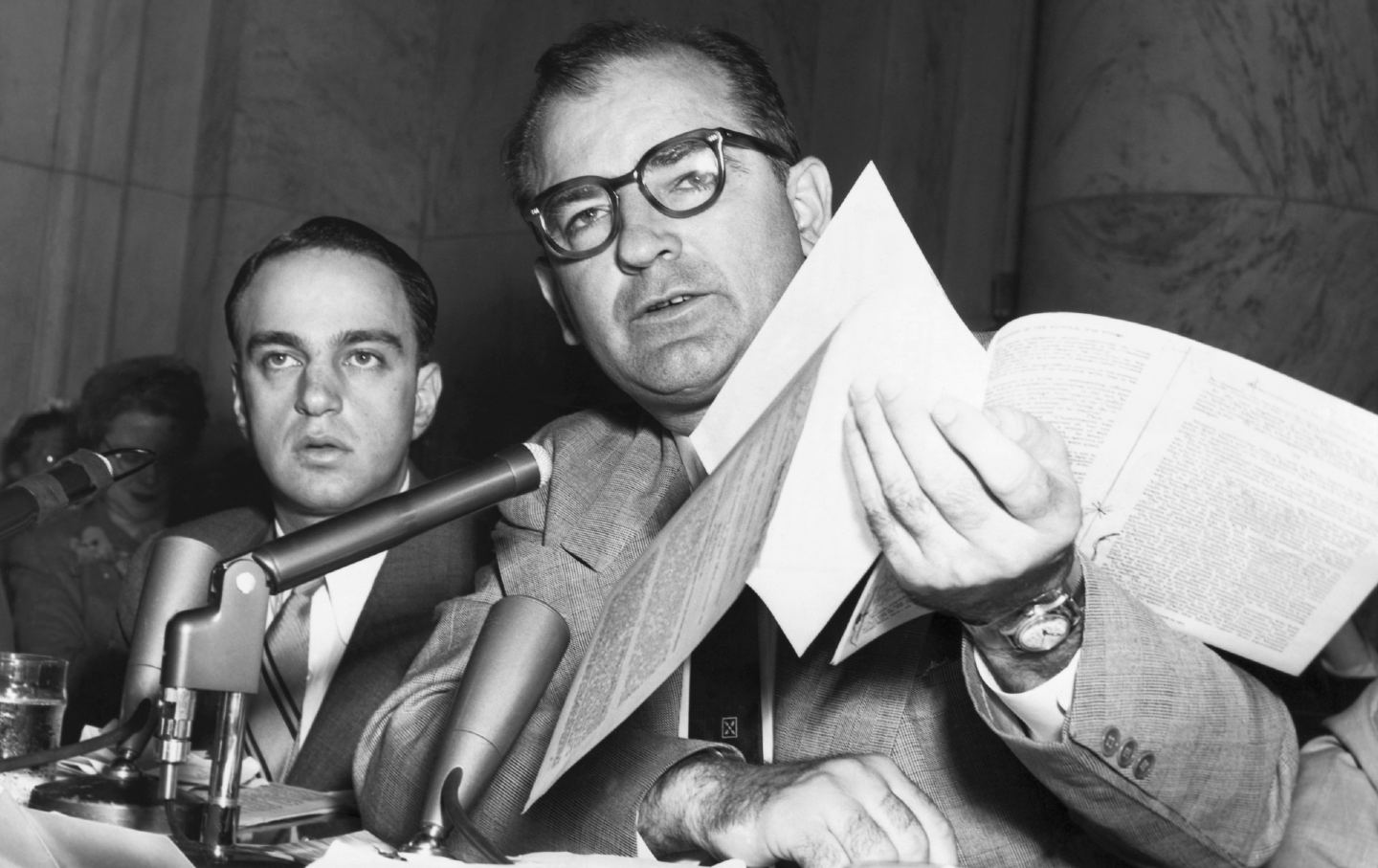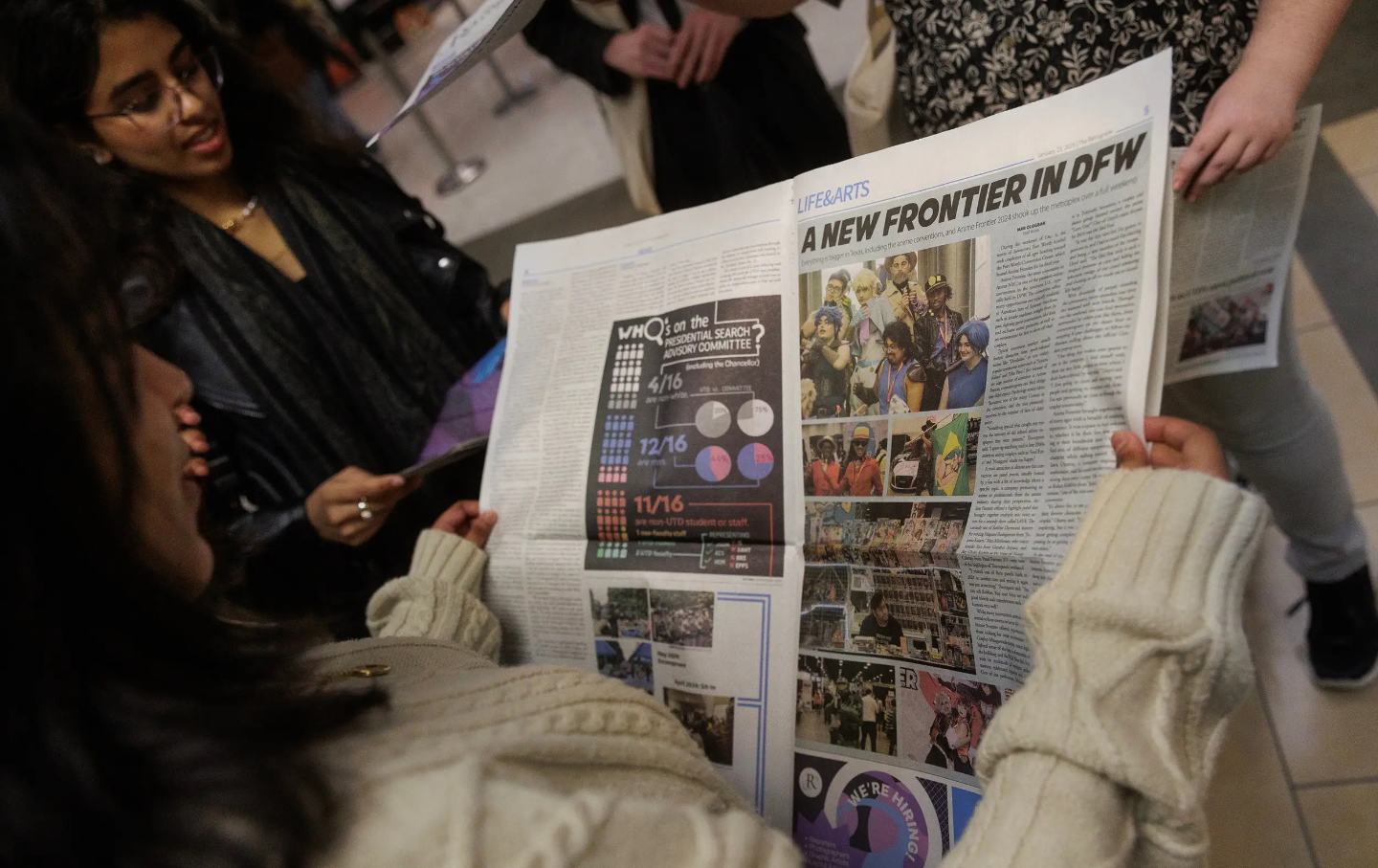Nex Benedict’s Queer Classmates Say the Biggest Bullies Are the Politicians
The death of a trans teen catapulted Owasso into national debates about trans rights. But the Oklahoma town’s queer community has been at the center of controversy before.

A candlelight vigil for Nex Benedict held at As You Are Bar on February 22 in Washington, D.C.
(Astrid Riecken / The Washington Post via Getty Images)Before an Oklahoma medical examiner ruled the death of Nex Benedict, a 16-year-old trans trans student, a suicide; before his name was a trending hashtag; before Benedict collapsed in front of his mother and grandmother; and before high school bullies repeatedly bashed his head against the tile floor—the far right had already targeted the queer community in Benedict’s hometown of Owasso, a midsize suburb outside of Tulsa.
Much of the initial outcry following Benedict’s death asserted that he had been murdered. After all, Benedict had died a day after going to the hospital with signs of a serious head injury. But the medical examiner’s summary report concluded that he didn’t die from brain trauma, ruling that he instead likely overdosed on antidepressants and antihistamines. We’ll know more soon; following state law, the full report will be made public by March 27. Benedict’s family released a statement on March 14 that revealed additional information that emphasized the severity of the attack. The family said contusions, hemorrhages, lacerations, and abrasions were found on Benedict’s head.
Benedict’s death catapulted the Owasso Public School District into national debates about trans rights. Vice President Kamala Harris tweeted her support for Benedict and to “the LGBTQI+ youth who are hurting and are afraid right now,” adding that she and President Joe Biden “stand with you.” Meanwhile, when asked in a public forum about the teenager’s death, Republican state Senator Tom Woods remarked, “I represent a constituency that doesn’t want that filth in Oklahoma.” (The “filth” in question being queer kids like Benedict, as opposed to the people who attacked him. Woods’s office declined to comment.)
But this is not the first time the town’s queer community has been the center of controversy. In 2022, local conservative commentators hounded Tyler Wrynn, a teacher at Benedict’s middle school, because Wrynn ran a TikTok account about being a queer educator. Libs of TikTok, a right-wing Twitter account, posted about their resignation to its over 2.9 million followers. (Wrynn declined to comment for this piece, citing ongoing safety concerns for queer people in Oklahoma.) Later, Ryan Walters was elected to the Oklahoma educational superintendent position, putting him in charge of the Department of Education, where he oversees the curriculums of students across the state. He campaigned on restricting the rights of and protections for trans kids, combating critical race theory in the classroom, and purging the public-school system of anything and anyone he sees as promoting “woke ideology.”
Friends of Benedict and queer students from Owasso told me that in their town, in the heart of the Bible Belt, the biggest bullies aren’t other kids; it’s the state and national political leaders. So far in 2024, seven state legislatures have passed anti-trans bills. And of the more than 500 anti-trans bills that have been introduced or advanced during that time, Oklahoma produced 60 of them—or 11 percent of all anti-trans bills in the United States, including federal ones. This comes after the record-breaking transphobia of 2023, where 600 anti-trans bills were considered at the state and federal level, almost a third of which focused on schools. In total last year, 87 bills were passed.
Spring 2022 was the tail end of Benedict’s eighth grade year. He and his then-boyfriend, Robin Ingersoll, who is also trans, were excited about becoming high schoolers. Benedict was a tough kid, Ingersoll told me, and “he would do anything for the people he loved.” Ingersoll, now 16, said on their first date that Benedict, who loved to cook, made hot wings for dinner and pancakes in the morning.
LGBTQ Owasso students told me that some queer kids were bullied or teased, but no one I spoke to could recall any high-profile anti-LGBTQ incidents involving students before this—though, as one Owasso student put it, there was a tacit “don’t ask, don’t tell” expectation. In other words, you won’t be bothered so long as you don’t look or act queer.
At the same time, Ingersoll said that Owasso school administrators had found ways to support Benedict. While Oklahoma prohibits trans students from using restrooms that don’t align with the gender they were assigned at birth, the Owasso Public School District said that it was working to ensure that no one was forced to use a restroom facility that did not align with their gender. The school, for instance, offers unisex, single-stall bathrooms. (Benedict’s attack transpired in the women’s restroom.)
At the middle school, Wrynn created a safe space for gender-nonconforming kids. Benedict, Ingersoll, and other students—many but not all of whom were queer—often spent lunches with Wrynn. Then, in April 2022, Wrynn’s TikTok found its way to Owasso parents, who complained to the district, which then put Wrynn on administrative leave. This is when Chaya Raichik, who runs the Libs of TikTok account, reposted a video of Wrynn offering words of compassion to their followers, many of whom were young and queer. “I love you. I’m proud of you,” they said. Afterward, Wrynn received a barrage of death threats. Juliette Kayyem, a professor of international security at Harvard Kennedy School, calls Libs of TikTok a project of “stochastic terrorism” that incites violence against queer people.
“It became a national debate,” said Koda Forrester, a former student of Wrynn’s who is now a 16-year-old sophomore at Owasso High School. She said many students wrote to elected officials, fielded press inquiries, and spoke at district meetings. She also said it divided kids, turning LGBTQ identities into a topic of contention and causing anxiety for queer students like her—all while she was trying to adjust to class without one of her favorite teachers.
“As eighth graders, that is a really big deal to have so many students advocate for that, because we just had our teacher randomly ripped from our classroom so close to the end of the year,” Forrester said. “We were completely thrust into a new learning environment. A lot of students struggled with that.”
It also sent a message to students, Ingersoll told me: Hide who you are, or face the consequences. Benedict’s mother, Sue, told The Independent that Nex, who “greatly admired” Wrynn, took the teacher’s ousting especially hard.
Libs of TikTok soon put Owasso in the spotlight again. In fall 2022, Libs of TikTok targeted Owasso schools for an allegedly “pornographic” comic book in its library called Blankets, which the school had removed from circulation. (The account’s posts about Wrynn and Blankets have since been deleted. Raichik did not reply to requests for comment.)
Around this time, Walters won the race for district superintendent. In December 2022, he reposted an article alleging that a transgender girl in Oklahoma had attacked another student in the bathroom. “We will not allow the left’s woke ideology to endanger our girls by allowing boys into the girls restroom where assaults like this one can happen,” Walters wrote on Facebook.
Kane Kieler, a trans employee of the State Department of Education when Walters took power, said the ensuing havoc was swift and brutal, recalling the change to a “divisive and unsafe work culture.”
“Everyone was either quitting or getting fired,” he said. “There were entire departments gone.” The Oklahoma Department of Education did not reply to requests for comment.
Then, in January of this year, Walters appointed Raichik of Libs of TikTok to the state’s Library Media Advisory Committee, which issues guidance to the Oklahoma State Board of Education regarding the content of books and materials available in public schools, including which books to ban. The committee has overwhelmingly targeted books featuring people of color and themes of gender or queerness. Raichik has never lived in Oklahoma, and, as a real estate agent turned content creator, she does not have any academic or professional background in education, child development, or library sciences. Walters did not care. “Chaya is on the front lines showing the world exactly what the radical left is all about—lowering standards, porn in schools, and pushing indoctrination on our kids,” Walters wrote in a press release. “Her unique perspective is invaluable as part of my plan to make Oklahoma schools safer for kids and friendly to parents.”
That comes from a statement from January 23, 2024; two weeks and a day later, Benedict’s classmates would corner him in a bathroom stall at Owasso High School.
Popular
“swipe left below to view more authors”Swipe →It’s unclear whether Benedict’s alleged attackers knew that he was trans, although students described Benedict—who often wore all black and had cropped hair—as appearing gender nonconforming. They also said teachers called him “Nex” in class.
Evidently, Benedict had only just met his would-be attackers earlier that week. According to testimony Benedict provided to Caleb Thompson, who serves as Owasso’s school-resource officer and was at the hospital after the attack, Benedict and the students had crossed paths while in “ISP”—shorthand for “Individualized Support Plan,” which is a sort of extended in-school detention for the duration of the school day. Benedict and several friends had been sent there after being caught vaping on school grounds. In messages to a friend dated February 5, Benedict complained that other students in ISP “called us furries and won’t stop staring.”
Benedict was not a furry, but four queer Owasso students told me that at their high school, “furry” is an insult almost exclusively levied against trans or gender nonconforming students, especially those with an “alternative” fashion sense. Conservative lawmakers have repeatedly and erroneously conflated the subculture, in which participants dress up as anthropomorphic animal characters, with trans identity. A proposed bill from earlier this year even called for “students who purport to be an imaginary animal” to be removed from school grounds by animal control.
Over the course of several days spent in ISP, things escalated. “I got jumped,” Benedict told Thompson from a hospital bed. Benedict said a group of students had been “antagonizing” him and his friends throughout the week about “the way that we dress.”
The officer asked Benedict if he had reported the harassment. Benedict said no—he “didn’t see a point.”
So when the teacher released the ISP students for a bathroom break and the girls kept taunting him, Benedict splashed water from a bottle on them. The girls responded by tackling Benedict and repeatedly bashing his head against the tile, according to his testimony in the hospital. A friend of Benedict, also in the bathroom, tried to shield him, but at that point, it was too late. Benedict told Thompson, “I blacked out.”
Security footage from Owasso High School shows Benedict walking out of the restroom. He went to the hospital later that day with concussion symptoms. But because he had thrown water on the girls, he also faced suspension—or worse.
“The way the courts are going to look at it is it’s a mutual fight,” Thompson told Benedict in the hospital. “So both parties are victims, but both parties are also suspects.… [He] was the one who initiated it, essentially, because you got freedom of speech…[but] the action of physically throwing that water—you’ve now assaulted somebody. You made the first jab. It doesn’t make it right, but they ‘defended themselves,’ quote unquote.”
The district said privacy laws prevent it from disclosing what disciplinary action, if any, has been taken against the students who assaulted Benedict.
At the hospital, the body camera recorded Officer Thompson saying, “I’ll see you around,” and then shaking Sue’s and Nex’s hands. “Hopefully not,” Nex replied with an uneasy laugh.
The next day, while at home with his grandmother and mother, Benedict collapsed. He was pronounced dead at the hospital that night.
News of Benedict’s death came out in bits and pieces. The district’s initial e-mail to students announcing his death did not name him or elaborate on the circumstances, and was largely devoted to explaining the increased surveillance and a greater police presence students could expect to see upon their return. Within two weeks, the story had been picked up by local advocacy groups. Then it hit local news, then the world.
On February 21, the police department deviated from its normal practices and released a preliminary assessment of his cause of death, which did not suggest Benedict died from trauma. A spokesperson for the department reiterated that the report was not final but explained that the police wanted to “head off some of this national scrutiny.”
The initial evaluation, the security- and body-camera recordings, and Sue Benedict’s 911 call were each released to the public with little to no notice for Benedict’s family. “I found out just minutes before, and I lost it,” Sue told The Independent about the footage. “That was my baby, my child.”
Since Benedict’s death, Owasso High School has received numerous threats of violence, at least one of which the FBI deemed “credible.” On February 26, dozens of students participated in a walkout to protest the district’s bullying policies, which demonstrators said do not take student complaints of harassment seriously. Ingersoll said the protest was “empowering.” But Forrester, from Wrynn’s class, did not attend; she and others told me that many kids stayed home from school because they were concerned about their safety. Some are worried about upticks in anti-LGBTQ attacks or other kinds of student violence.
At least one nonstudent counterprotester did show up, and he carried a sign reading, “Got AIDS yet?” He also livestreamed himself shouting homophobic and transphobic pejoratives with a bullhorn and condemning Benedict to an eternity “in hell.”
Then, on March 6, the Westboro Baptist Church, an anti-LGBTQ religious fringe group, traveled to Oklahoma from Kansas to demonstrate outside Benedict’s school.
And it’s not just outsiders stirring hate against the school’s queer population. One Owasso student showed me images from the school’s Snapchat story, to which anyone on or near school grounds can upload a post. I saw one photo with text declaring that there were “too many alphabet people” at the school—meaning there were too many LGBTQ students.
The anti-trans movement is growing across the country. Between the moment Benedict emerged from that bathroom on February 7 to the publishing of this article, dozens of anti-trans bills have advanced in statehouses. Schools are increasingly finding themselves targeted by Libs of TikTok and other local far-right blogs and social media accounts. Countless queer educators and students have faced threats of violence. And districts across the country are unraveling years-old policies protecting trans kids—including those in my own hometown in Marlboro, N.J., as I reported for The Nation.
In Oklahoma, a trans kid can’t use the bathroom, access evidence-based medical care, play on a sports team, update their school records, or even use their own name without the state getting involved. It shouldn’t be surprising that in the aftermath of Benedict’s death, calls to the state’s crisis hotline for LGBTQ youth have increased by 300 percent.
But queer-advocacy groups are fighting back, hoping to turn Benedict’s story into a catalyst for change. Vigils across Oklahoma and the country were held in Benedict’s name. At a March 11 Board of Education meeting in Owasso—the first since Benedict died—student alumni and parents accused the district of ignoring their own complaints of anti-LGBTQ bullying and violence. And the federal Department of Education has announced an investigation into the district for allegedly failing to respond to reports of sex-based harassment.
Amid the chaos, some students at Owasso have felt drowned out. “I never really liked the fact that Nex was becoming some sort of political martyr,” said Alison, a 16-year-old sophomore at Owasso. A longtime friend of Benedict, Alison is queer and asked to be identified with a pseudonym because she is not yet out to her parents. “It’s kind of strange seeing him everywhere on the Internet,” she told me. “Like, you scroll a few videos, and all of a sudden, it’s, ‘16-year-old nonbinary student, Nex Benedict.’”
For Alison, he was more than “the trans kid who was murdered in the bathroom.” Alison knew him as a friend who was “honest and nice and loyal”—a teen who wanted to grow up and work as a dog handler for the Army or get a job with horses so he could become “Cowboy Nex.” He was the kid who rescued a black cat off the streets and nursed it back to health. He was the kid who wasn’t afraid of anything. His classmates told me his fearlessness may be one of the reasons he had a harder time than some other queer and trans students at school: Benedict did not hide who he was, a feat that came at a great cost to a trans kid growing up in Owasso.
“He taught me how to stand up for myself,” Alison said, “no matter what other people think.”








